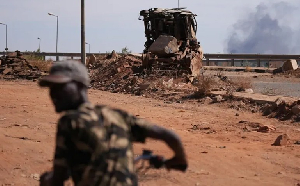AngloGold has failed the nation, not being able to turn the Obuasi mine into a world-class gold producer with a growth focus after its acquisition in 2004, a senior member of the Ghana Mineworkers’ Union has told the B&FT.
The union member, who preferred to be anonymous, blamed the decline of the mine on the use of inappropriate technology by the company and the poor philosophy and style in managing the mine.
“AngloGold has failed the nation. The promises they gave since they took over the mine have not been delivered. The AngloGold management team has already conceded that they made mistakes in dealing with the Obuasi mine. In our engagement with them, we made them aware and they conceded that a lot of things have gone wrong,” the source said.
He said apart from obsolete technology, one critical mistake is the regular transfer of top management from the Obuasi mine.
“The kind of technology and model they introduced were alien to the Obuasi mine; the ore body in South Africa is entirely different from the Obuasi mine.
“Different managements come with different corporate styles and philosophies. There are a lot of things that went wrong. The result of all these actions is with us now,” he said.
Last week senior management of AngloGold called a stakeholders’ meeting in Obuasi, where they announced plans to revive the mine within the next 24 months, while giving indication that a large number of the 6,500 staff will be retrenched in the process. The estimated cost of retrenchment is US$220 million, and workers will be helped with advice on how to use their pay-offs.
“AGA is facing this challenge head-on; it’s about taking the short-term pain for future benefit,” said Steve Rickman, Senior Vice President for Organisational Effectiveness.
Company executives said a radical approach is being taken to the mine, whose age – 117 years –brings with it a rash of challenges. The mine is going to be shrunk to a single tailings source and underground mining put on hold, while AngloGold sinks a decline shaft from the surface to 26-level and later to 41-level.
At the same time, Obuasi’s social footprint will be reduced and a new high-grade operation brought about within a smaller concession area.
These interventions will draw support from government and all stakeholders, said Mark Morcombe, AGA Senior Vice President for Ghana.
“It is for this reason that the company has been in discussions with government, the workers’ union, and regulators to ensure the future viability of the operations of the mine and position it in the right place to guarantee its future,” he said.
Obuasi’s challenges have been worsened by the fall of the gold price since the beginning of 2013 from its record highs in the prior decade. The metal’s price has dropped by more than 20 percent since January last year, and in the wake of that AngloGold retrenched some 430 workers initially.
The company said it injected US$120 million of shareholders’ money into Obuasi in 2012; another US$220 million in 2013; and has invested US$40 million so far this year.
Business News of Monday, 26 May 2014
Source: BFT
AngloGold chided for Obuasi mine quagmire
Entertainment












